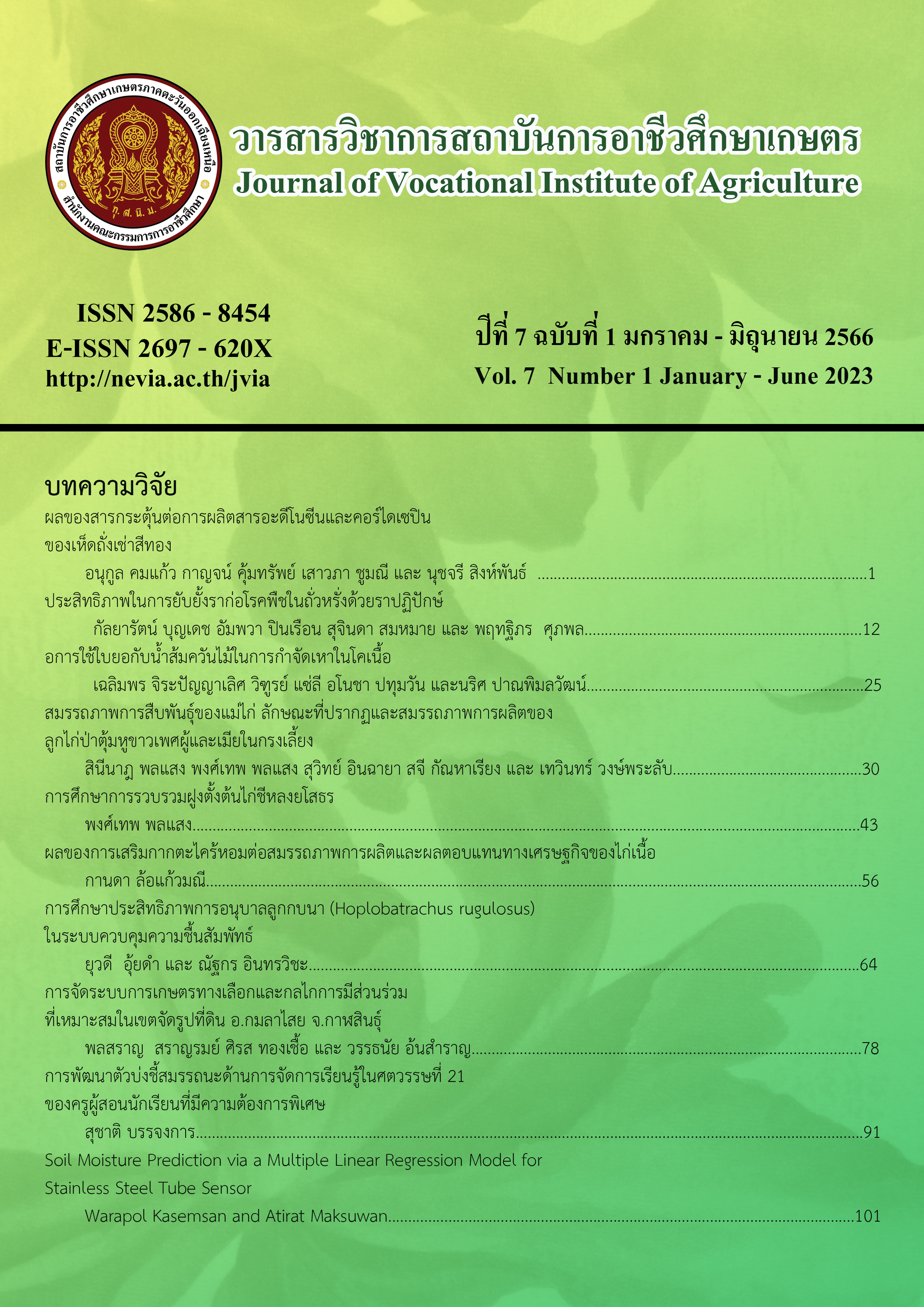Effect of citronella grass (Cymbopogon nardus) meal supplementation on broiler productive performance and economic return
Main Article Content
Abstract
This research aimed to study effects of citronella grass meal supplementation on broiler productive performances and economic return. Completely randomized design (CRD) was used in this experiment. There were four treatments that the percentages of the citronella grass meal at 0, 1, 2 and 3%, were added in a commercial broiler diet. The results showed that the birds fed with 0 and 1% citronella grass meal diet had the highest body weight gain (P<0.05). Broilers fed with 0% citronella grass meal diet had the highest feed intake (P<0.05) whereas the birds fed with 0, 1 and 2% citronella grass meal diet had the highest average daily gain (P<0.05). Broilers fed with 3% citronella grass meal diet had the lowest feed conversion ratio and had the lowest feed cost per kg of the body weight (P<0.05). In addition, the birds fed with 3% citronella grass meal diet had the highest net profit return per bird (P<0.05). Based on these results, it could be summarized that 3% of the citronella grass meal was the best level to be supplemented in the commercial diet.
Article Details

This work is licensed under a Creative Commons Attribution-NonCommercial-NoDerivatives 4.0 International License.
The content and information in articles published in the Journal of Vocational Education in Agriculture are the opinions and responsibility of the article's author. The journal editors do not need to agree or share any responsibility.
Articles, information, content, etc. that are published in the Journal of Vocational Education in Agriculture are copyrighted by the Journal of Vocational Education in Agriculture. If any person or organization wishes to publish all or any part of it or to do anything. Only prior written permission from the Journal of Vocational Education in Agriculture is required.
References
Alzawqari, M. H., et al. (2016). Effect of feeding dried sweet orange (Citrus sinesis) peel and lemon grass (Cymbopogon citrius) leaves on growth performance, carcass traits, serum metabolites and antioxidant status in broiler during the finisher phase. Environmental Science and Pollution Reserch, 23(17), 17077-17082.
Wanapat, M. A., et al. (2008). Manipulation of rumen ecology by dietary lemon grass (Cymbopogon citrus Stapf.) powder supplementation. Journal of Animal Science, 86(12), 3497-3503.
Khattab, M. S. A., et al. (2017). Impact of lemongrass and galangal as feed additives on performance of lactating Barki goats. International Journal of Dairy Science, 12, 184-189.
Sanit, S., et al. (2010). Effects of some plants crude extracts on inhibitory growth of Chinese Kale (Brassica alboglabra L.). In The 48th Kasetsart University Annual Conference (p. 412-421). 3 - 4 February, 2010, Bangkok, Thailand. (in Thai)
Annonyms. (2022). Citronella. Available from URL. http://www.phargarden.com/. Accessed date: 24 June 2022. (in Thai)
Mmereole, F. U. C. (2010). Effects of lemmon grass (Cymbopogon citratus) leaf meal feed supplement on growth performance of broiler chicks. International Journal of Poultry Science, 9, 1107-1111.
Parade, A. K. B. (2019). Use of lemon grass (Cymbopogon citratus) leaf meal as a natural feed additive on growth performance and economics of broiler. International Journal of Current Microbiology and Applied Sciences, 8, 1842-1849.
Farueang, P. (2018). The use of lemongrass as animal feed additive. Songkhla: Prince of Songkhla University. (in Thai)
Kumar, M. (2003). Effect os dupplemented prebiotics, probiotic and turmeric in diet on the performance of broiler chicks during summer. International Journal of Poultry Science, 40, 137-141.
Mukhar, A. M., et al. (2012). Effect of different levels of lemon grass oil (LGO) as a natural growth promoter on the performance, carcass yield and serum chemistry of broiler chicks. Egypt Journal of Poultry Science, 33(1), 1-7.
Tiwari, M. R., et al. (2018). Performance of lemongrass (Cymbopogon citrates) oil as growth promoter in broiler. Bangladesh Journal of Animal Science, 47(2), 85-91.

